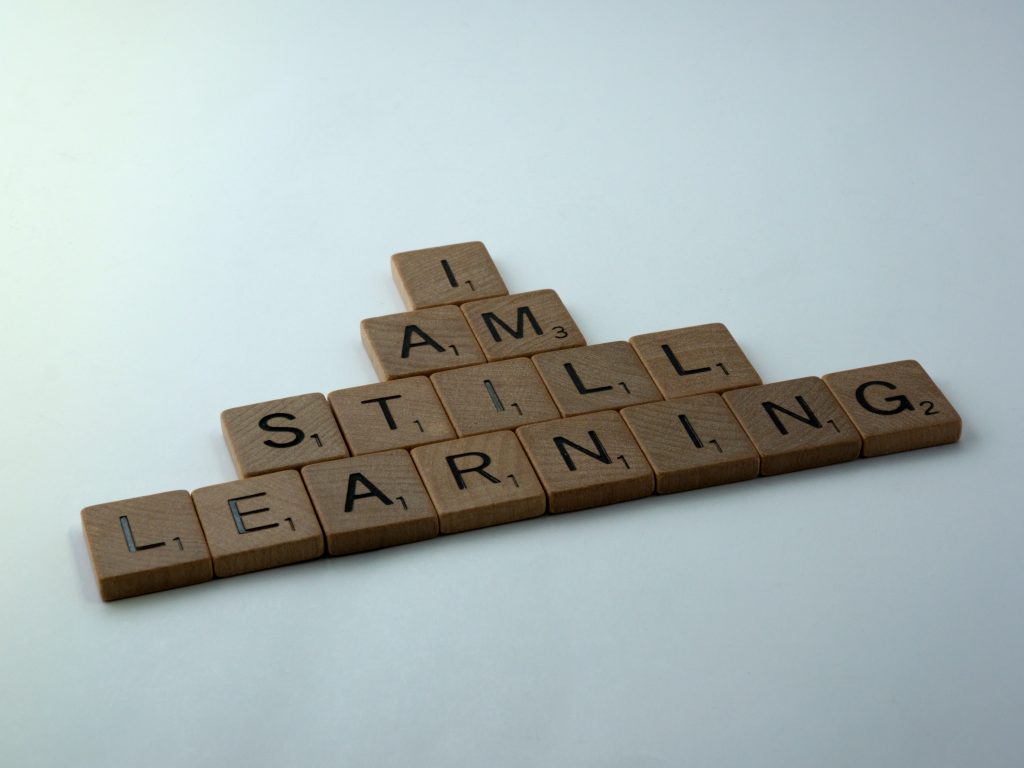
This paper reports on a small sample taken from a larger doctoral study (see Moore, 2020 for full study). The paper uses qualitative narrative methods to explore the issue of CPD for social workers. It’s a timely paper as Social Work England have reopened their re-registration process and social workers up and down the country will start wishing they had kept a proper record as they went along, (a mutter that is heard in social work offices every year and has been since registration began in the early 2000’s).
The meaning and importance of CPD has been a central discussion in social work for a long time, however this paper takes a different approach and looks at the emotional experience of learning in and of itself for individual social workers and how early learning experiences can shape current responses.
Studies across several disciplines have highlighted that CPD is viewed as largely positive by all professions, but that the learning can be experienced as vulnerability for some, and professional engagement with CPD is influenced by the emotional experience, as much as, if not more than, the actual content of the training and its learning outcomes (Moore, 2020).

CPD is seen as positive, but is that really the case for everyone, how can social workers counter previous difficult experiences in order to meet the CPD requirements of their professional registration?
Social work considers itself comparable with its colleague regulated professions (e.g., nursing, occupational therapy and physiotherapy for example) with professional regulation setting out the standards and expectations of the role, and an explicit commitment to life-long-learning and continuous CPD as an essential part of professional practice. While most social workers would agree with the principle and annually sign up to say they have met the standards, for some practitioners this is easier and more instinctive to embed within daily practice than for others. This study drills down into the reasons why this might be the case, considering the experience of CPD from a psychodynamic perspective with a small group of social workers. Asking the question what impacts and influences how we learn as professionals and making the link between early experiences of learning and participants current engagement and emotional responses to CPD as a social work professional.
Methods
A qualitative case study approach is used, with the findings from eight interviews with social workers, which were then analysed to identify key themes. The sample in this case were self-selected, with social media and professional networks being used to recruit participants to the study.
The researcher used a narrative interview method which was based on free association (see Holland & Tony, 2008), starting with a standard statement about the purpose of the interview, based around an agenda determined by the participant rather than a set of pre-determined questions. This approach allows the interviewee to direct the conversation and is very much aligned to conversational and strengths-based relational understandings of the world that are very much a focus in practice in recent years.

Narrative interview methods based on free association were used to identify themes in each participant’s experience of learning and what these might be influenced by.
The eight interviews were transcribed and processed through a clever bit of software to code and identify themes (in this case MAXQDA for those interested – many a researcher’s friend, and one of the several data analysis options out there which are far more efficient, robust, and greener, than the reams of typed paper, spreadsheets, and different coloured highlighter pens – the manual, pre-tech version). In addition to the thematic analysis, two case studies are examined to provide depth to the discussion and its findings, and to consider the widest range of diversity factors between the participants and their experiences.
Results
The study found that the emotional experience and memory of learning, including whether it was supported or dismissed by participants families and social networks, influenced the degree of anxiety (or enthusiasm) that people experienced when undertaking their CPD. This included both an impact on their engagement with the process, and which learning methods they preferred to complete.
Several areas/themes are identified as factors/variables that influence a social worker’s learning journey both at the outset of, and throughout, their careers. The first observation is that those who had been disparaged for learning within the family unit or social community or had poor experiences within the school environment, were more likely to experience difficulties in engaging in education as an adult.
“Adult learning is not fully shaped by childhood experience and compensatory experiences can prevail or mitigate…[but] evidence from this small group of social workers suggests emotional impact of early learning experiences is lasting” (Moore, 2023, p.11)
However, the researcher is keen to point out that adult learning is not fully shaped by childhood experiences, and whilst taking a psychodynamic perspective, recognises that there are a wide range of variables that also have impact – the quality and methods of the training, the context of the learning, and whether you give delegates chocolate, or not, can all impact on training evaluations (this elf appreciates chocolate as an engagement strategy – Dark Chocolate Buttons are a delicacy down in the woodland).

A positive experience of learning can counter earlier experiences.
Conclusions
The qualitative data from the eight participants, supported by the detailed case studies of 2, provides depth of information, and demonstrates that for this sample group at least, CPD was an emotional activity for the individuals taking part. This finding is then used to develop and suggest a model from which we can consider social work education and learning. The researcher proposes the Learning Response Model (see illustration below), which makes a great deal of sense in terms of the relational aspects of CPD and practice generally.

The researcher has developed the learning response model as a way of understanding a social workers relationship with their own CPD. Source: Moore, 2023; p.11
Strengths & Limitations
Whilst there is not a specific section on limitations of the study within the paper, the researcher highlights the limitations of the study, the areas of potential bias, and the potential for further research throughout the main body of the paper. Small sample size, and the self-selection of the sample are both limitations, however as with many qualitative studies of this nature, what it provides is a framework of thinking about engagement with learning. For those of us who live in professional education settings, the paper is useful in highlighting areas to consider in relation to engagement with the participant group.
From a validity perspective, the paper is part of a larger study, using qualitative and analytical methods, which are not fully explained in the paper, but are signposted for those who are particularly interested in research methods and analytical software used.
As a stand-alone research report it does not fully identify its own limitations, but neither does it claim generalisability, with the aim clearly being to develop a model for thinking about learner experiences and how they can be rescripted or repeated.
One of the limitations the author points to is that those that took part were interested in their own CPD and took responsibility for their learning, but what about those that didn’t? Social workers routinely miss the submission deadline, don’t submit the required evidence or otherwise don’t value the CPD requirements that the regulator places on them (not all – many embrace learning as part of the profession, but this isn’t universal, and we need to be considering why not).
Implications for Practice
CPD and the learner experience have a wide range of considerations for both social care and social work as a profession, and what the research identifies is that the learning experience does not happen in a vacuum, it is influenced by a wide range of factors, both past, current, and future focused, and these need to be thought about as CPD is planned and developed.

Learning does not happen in a vacuum, its is an emotional experience that can be influenced by a wide range of factors – past and present.
One final thing to consider in the context of this paper is the changing/changed face of social work CPD. Once upon a time we counted training days – how may classroom hours have you clocked, now however the key is impact. To consider impact of learning we also need to consider the impact of how it is delivered, particularly considering the finding that emotional experience impacts our ability (and willingness) to learn.
The pandemic changed the face of social care and social work training for some and made no difference to others. The move to online learning is anxiety provoking for many, and if the narrative that someone is bringing into the training room is based on feelings of vulnerability and anxiety, then there is no wonder that people disengage and hide behind ‘my camera isn’t working’ or ‘I can’t get into the meeting’ rather than engage with the digital revolution. As many of you will be aware I’m an advocate of digital learning, but that is live digital learning that uses the full interactive capabilities of the tech that is currently available, not something that is found everywhere and something we have developed over time with a focus on the engagement from the minute someone walks into one of our virtual rooms.
Conflicts of Interest
None
Links:
Primary Paper:
Tanya Moore (2023) The emotional experience of continuing professional development, Journal of Social Work Practice.
Other References:
Hollway, Wendy and Jefferson, Tony (2008). The free association narrative interview method. In: Given, Lisa M. ed. The SAGE Encyclopaedia of Qualitative Research Methods. Sevenoaks, California: Sage, pp. 296–315.
Moore, T. (2020) The emotional experience of continuing professional development for social workers. Professional Doctorate Thesis, Tavistock & Portman NHS Foundation Trust / University of Essex. https://repository.tavistockandportman.ac.uk/2268/1/Moore%20-%20Emotional.pdf
Photos Credits:
- Photo by Alexander Grey on Unsplash
- Photo by Brett Jordan on Unsplash
- Photo by Jason Goodman on Unsplash
- Photo by krakenimages on Unsplash
- Photo by Tim Mossholder on Unsplash
